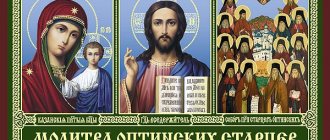When Lent begins, believers who come to church hear a large number of different prayers. But the prayer of Efremov the Syrian sounds much more often than all others. It is necessary to read this prayer twice in one day, this is a prerequisite. But the prayer does not sound every day; there is no need to read it on Saturdays and Sundays.
About the author About the book
During the first reading of this prayer, a person bows to the ground after each petition. Then he needs to repeat 12 times: “God, cleanse me, a sinner,” while making small bows. Next, you should read the entire prayer again and make one prostration.
The path to a new life is repentance
Ephraim the Syrian is a Christian poet and also a theologian. In part, these abilities allowed him to write truly the most effective prayer of repentance, thanks to which it acquired the appropriate name - repentance. In addition, the text is read during Lent. This is where another name came from - Lenten.
Ephraim was canonized after his death
acquired the status of Reverend.
According to the new calendar style, his memory is celebrated on January 28 (in Orthodoxy). Since then it has been the day of St. Ephraim the Syrian. He was born to pious people. However, it cannot be said that the young man kept the commandments in his youth. On the contrary, Ephraim committed unseemly acts, which is why one day he heard a voice that asked how many offenses he had caused people, how heavy this burden was for them and for himself. This helped me reevaluate my actions and thoughts.
Ephraim became a hermit and repented of his sins throughout his life. The word “repentance” literally means “a change of mind and properties of the soul.” Accordingly, a layman who repents of his sins, prays for forgiveness, brings the Kingdom of God closer and will himself get there. Repentance is preceded by a descending understanding of the depth of one’s own guilt before another person, sin. This also creates a feeling of remorse. If you sincerely ask for forgiveness from the Lord, your sins will be forgiven.
After this, your lifestyle changes
thoughts, awareness appears in thoughts and actions.
A person no longer acts without thinking, but evaluates the risks of committing wrong actions for himself and others, does not live in sin, since he avoids temptations and can resist them. Ephraim also repented. Until the end of his days he performed pious deeds. He chose his own path - he was engaged in writing essays, which were later read in churches, some of which became part of the liturgical use of prayers. Ephraim also wrote poems that were later used against heresy.
Despite the high level of knowledge, Sirin Efim called himself “unlearned, weak-minded.” In fact, many of the wisest of his time admired how smart he was. The monk was engaged in translations and knew the Psalter. He also offered an interpretation of the Holy Scriptures (Psalms). However, Ephraim's creations have reached the modern world only partially. He wrote more than 1,000 works and essays, and about a quarter of this amount was published.
Moreover, many of the works that the Slavic tradition attributes to Sirin
are not authentic.
Contemporaries called Sirin the Syrian Prophet. Ephraim wrote not only essays, but also expressed his thoughts and feelings about the future and present. He was considered a true speaker of the Christian word. Moreover, he did not use artificial verbal structures in his speeches. The creations of Ephraim were devoid of idle talk.
In his sermons, Ephraim spoke about the approach of the Last Judgment, repentance (first of all), advised parents and paid due attention to the upbringing of children. Moreover, Saint Ephraim read sermons, but at the same time they were devoid of gloom. By the way, the Reverend himself always said that despondency is a sin. If the reader has children, he should ask for them as well.
Even when a person experiences mental anguish for the sins he has committed, he should not humiliate himself.
Dejection is a state in which a self-destruction program can be activated,
and after that comes physical death.
Special details of the Saint’s life can be found on the Optina Pustyn website.
What do they pray for?
Prayer to St. Ephraim the Syrian is necessary for repentance. It indicates all the sins that people commit most often and all those that are very terrible, they prevent a person from repenting. What they ask for in prayer:
- very often people spend their time carelessly or are simply too lazy to do something, this is considered a sin, people in this prayer ask for forgiveness. After all, every person is endowed by the Lord with some unique talent, which he must use for the benefit of humanity;
- the prayer to Ephraim the Syrian is aimed at ensuring that a person gets rid of anger, becomes more patient and has his sins forgiven;
- people also ask to get rid of the angry and empty talk that they periodically make;
- Reading the prayer of Ephraim the Syrian during Lent, people want to acquire patience, for sin makes people impatient.
How to read the prayer of Ephraim the Syrian correctly?
If you plan to improve your state of mind, you can follow the rules for pronouncing prayer words. Recommendations:
- they begin to read it 1 week before Lent - Tuesday of Cheese Week;
- finish reading on Great Wednesday of Holy Week;
- the prayer text should be said after each Lenten service, and it is recommended to do this daily, starting from Monday and ending on Friday;
- during the first reading, after each phrase with a request, you need to follow the recommendations - make 1 bow, and it should be earthly;
- after reading, they read “God, have mercy on me a sinner,” and it is important to repeat this 12 times;
- when reading the short prayer “God, have mercy on me a sinner,” bows should be from the waist;
- at the last stage the text follows
Church Slavonic text, read at home
The version of the prayer in Old Slavic also brings good results. However, in this case, the likelihood of deep penetration and search for meaning is reduced. Without understanding prayer, it will be difficult to be imbued with sincerity.
It is necessary to read the version of the text with accents. If the prayer is difficult to come by, you should return to reading it in Russian. Moreover, it is possible to read the text online. You can print it for your own convenience. Before downloading, you need to select the path where the file will be saved on your PC so that you can easily find it.
Send this prayer to your loved ones
Send this prayer to your loved ones
So many bows are made to Pochepu
After each request of the prayer of Ephraim the Syrian, a prostration is made. For what? Man fell away from God soul and body; both soul and body must be restored to return to God. Salvation and repentance are not the contempt of the body, as is sometimes claimed, but its restoration.
After all, we will be resurrected in a body, only a new one. Christian asceticism is a struggle not against the body, but for it. Therefore, the whole person - soul and body - repents. The body participates in the prayer of the soul in the same way that the soul prays not outside, but in its body.
Prayer of those who offend Ephraim the Syrian
If you read this text, you will soon be able to forgive your offenders and enemies. At the same time, the soul softens. The reader prays for forgiveness for those who were unfair to him, offended him, or caused serious harm to his health. The writing of such a text in itself speaks of the holiness of Ephraim, since only a selfless person can pray for enemies without defending himself.
Have mercy, Lord, on those who hate me and envy me!
Have mercy, Lord, on those who slander me and cause me offense!
Do not do anything evil to them for Your unworthy servant;
but according to His ineffable mercy
and according to His immeasurable goodness, not in this life,
neither in the next century may they tolerate evil for me, a sinner!
Sanctify them with Your mercy and autumn with Your grace, O All-Blessed One,
because before all, blessed are You forever and ever.
Amen.
Send this prayer to your loved ones
Send this prayer to your loved ones
Send this prayer to your loved ones
A little history
The great ascetic was born into a family of pious Christian parents, but grew up mischievous and hooligan. As a youth, he committed many sinful acts and later went to prison.
Dormition of St. Ephraim the Syrian.
God's Providence forced Ephraim to analyze his life, as a result of which a real revolution occurred in the soul of the ascetic. The angel who appeared to him told the young man to repent of his sins and showed him a “thread”, at one end of which sins were collected, and at the other, fair retribution was visible.
Within the prison walls, a sinner was “reborn” into a future saint, teacher of the Church of Christ, author of prayers and chants, theologian and ascetic.
Interesting articles about Orthodoxy:
- Apostle Paul on love
- What is an Orthodox patriarchal family
- All about the Sacrament of Wedding
Why is this prayer read during services during Lent?
When pronouncing such a text, the main factors are present: gratitude to God, humility, and a repentant attitude. These qualities must be inherent in a follower of Christ. Praising the Son of God and asking for the forgiveness of sins are important stages of preparation for Easter, and therefore this prayer should be read during Lent, which will prepare the soul for the holiday.
What is special about prayer?
Saint Ephrem does not simply ask to be delivered from a certain type of sin, but mentions the spirit of passions. It’s like being uprooted so that not even the spirit (trace) remains inside. Do not tie up the adversary who is dragging you into a fall, but cast him out forever.
This indicates a deeper cleansing. Therefore, during fasting, a prayer of repentance is read, calling on God to deliver human nature irrevocably enslaved to sin, to free it from the harmful demonic bonds forever (crucify the flesh).
Note: Many works have been written about the penitential text: by saints, priests, saints, even A.S. Pushkin. Our article gives the briefest explanation. Those who want to comprehend the full depth are advised to turn to more worthy sources.











